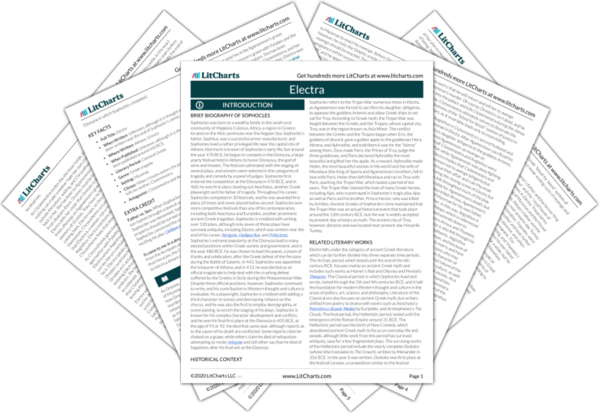Grief, Mourning, and Morality
At the center of Sophocles’s tragic play Electra is the grief and mourning of Electra, the play’s protagonist and title character. Electra’s deep anguish is the result of her father Agamemnon’s murder at the hands of her mother, Clytemnestra, and her mother’s husband, Aegisthus. Public mourning was expected of women in ancient Greece, as it was thought to keep the memory of the dead alive and promote catharsis; however, mourning during…
read analysis of Grief, Mourning, and MoralityJustice and Revenge
Sophocles’s tragic play Electra examines revenge and the ancient Greek “blood for blood” system of justice. Both Electra and her brother, Orestes, swear to avenge the murder of their father, Agamemnon, even though he was killed by their mother, Clytemnestra, and her husband, Aegisthus. According to myth, to appease the goddess Artemis and set sail for Troy, Agamemnon sacrificed his daughter, Iphigenia. This prompted a chain of events that led…
read analysis of Justice and RevengeGender and Society
While the theme of gender in Sophocles’s Electra may not be particularly apparent to modern readers, it would have been obvious to ancient Greek audiences. Greek theatergoers were very familiar with Aeschylus, another Greek tragedian and Sophocles’s contemporary, as well as his treatment of the same myth in his play The Libation Bearers. Aeschylus focuses almost entirely on Orestes, Electra’s brother, and his desire to seek revenge for his father Agamemnon’s…
read analysis of Gender and Society
Deception, Falsehood, and Trust
Sophocles’s tragic play Electra is rife with deception and falsehoods. For example, when Orestes goes to the Delphic oracle to ask exactly how he should avenge the murder of his father Agamemnon, the oracle says: “By lone deceit and stealthy craft / Must blood be shed and victory won.” From the very beginning, Electra is set in motion with the expectation of deceit, and deception indeed gains momentum throughout the play. Orestes…
read analysis of Deception, Falsehood, and Trust






